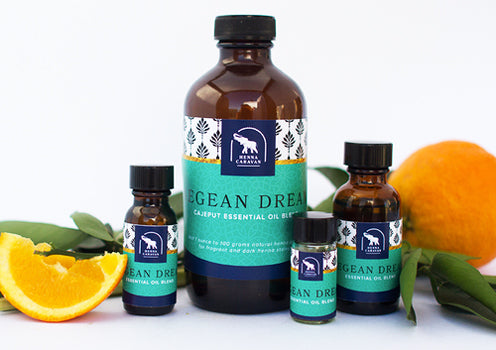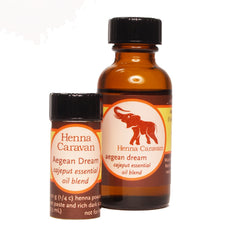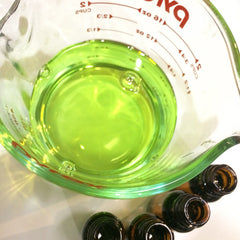Ingredients: Essential Oils

|
Did you know our essential oils are pre-measured for you?! |
How Much Essential Oil to Use in Henna Paste The standard guideline for essential oil in henna paste is:
*75% of this oil should be a Terp oil for maximum effectiveness *Essential oils are NOT added for scent. They are an ACTIVE INGREDIENT in the henna paste. |
|
|
ESSENTIAL OILS or "TERPS" These are what we call the main essential oils in the henna mix. “Terp’ is short for terpineol. We use oils high in terpineols and mono-terpene alcohols for the best dye release and darkest, deepest henna stains. Among the most effective and safest oils with high amounts of terpineol are:
|
|
|
SCENT ESSENTIAL OILS These are oils that can be added in small amounts (25% or less) to your main ‘Terp’ oil to adjust the scent and create your own signature smell. The scent of your henna paste can be adjusted by adding a few drops of other types of oils in addition to your main ‘terp’. Below are essential oils that are safe to use and will not inhibit your dye release and stain. Among the most effective and safest oils with high amounts of terpiniol and scents that blend well with the main TERP oils are:
|

|
Essential Oil Safety and Cautions
PREGNANCY, BREAST-FEEDING, CHILDREN, MEDICAL CLIENTS For applications used during pregnancy or on children, and medical clients (cancer patients, etc) Bulgarian or French Lavender essential oils should be used (Lavandula Angustifolia). They are mild and effective and have the most medical research and safety information available. |

|
Rosemary and Cedar Wood should never be used during pregnancy. There are essential oils that can cause serious damage during pregnancy, even induce miscarriage, it is important to be aware of the health risks of any oils you intend to use on clients. Mustard oil, large amounts of Clove oil and “mehandi” or “mehndi” oils should be avoided. Mustard and Clove oils can cause fairly serious burns to the skin. Clove BUD oil is safe to use in small amounts when diluted in the henna paste
Mehendi Oil = Toxic Additives and Mystery Ingredients This is most often an oil blend manufactured in India and imported. There is no such thing as essential oil from the henna/mehndi plant. This is an industrial blend of low quality. The ingredient list is often missing or fabricated. It commonly included kerosene, gasoline, benzene and a variety of other mystery ingredients. This is NEVER recommended and should not be used. Do NOT ever use: Kerosene, gasoline, acetone, lighter fluid, turpentine, paint thinner, urine, urea, ammonia, mustard oil, Walnut or Black Walnut powder/extract, Grapefruit Juice/Oil, Lime juice/Oil, Lemon Oil, Bergamot Oil. These ingredients can cause serious injury. Grapefruit Juice/Oil, Lime Juice Oil, Lemon Oil, Bergamot Oil These oils all cause photo-toxic reactions and should NEVER be used in henna paste. When applied to the skin and exposed to sunlight 3rd degree burns can result. *Bergaptene free Bergamot Essential Oil is SAFE to use as the chemical that causes photo-toxic reactions has been removed. * Grapefruit Oil and Juice interferes with many heart medications, are photo-toxic and should never be used. What about Eucalyptus Oil? It should be avoided on children under 10 years of age, during pregnancy and breast-feeding. Eucalyptus comes in over 700 varieties and there are multiple types of Eucalyptus essential oils available. The variety is often not indicated and it can be hit or miss in terms of effectiveness for henna. Some varieties work well for henna and some do not. We find that Cajeput, Tea Tree, and Niaouli oils (which are in the same family as eucalyptus) are SAFER, more effective and have higher percentages of terpenes and mono-terpene alcohols. We do not recommend eucalyptus as a reliable or generally safe essential oil for henna paste.
NEVER apply essentials oils directly to the skin. It DOES NOT create a better henna stain, and is not considered a safe practice and may cause injury or burns. Essential Oils can be extremely harsh and can cause injury, in addition many oils are not safe to use during pregnancy. Many essential oils should not be applied directly to the skin, should be used for external use only, and kept out of eyes. Please be aware of the risks and warnings for all of the oils you are experimenting with. Consult a book on essential oils or talk with your supplier and/or physician directly if you have any concerns. If you’ll be working with the public it is in your best interest to be well educated on the dangers and safety of your oils. |
|
VEGETABLE OILS Olive, corn, coconut, wesson cooking oil, apricot, grape seed, almond oil, baby oil, jojoba, cocoa butter, shea butter, or mango butter will not contribute to dye release and should NEVER be used in the henna mix or on the skin prior to application. These oils will create a greasy, oily barrier on the skin preventing the henna dye from soaking in. It'll wreck your henna paste. Vegetable oils ARE helpful for stain aftercare thought! Apply before bathing or swimming to protect the stain and extend it's life. |
|
|
We recommend these excellent essential oil resources |
Essential Oil Safety: A Guide for Health Care Professionals Book by Robert Tisserand and Rodney Young Encyclopedia of Essential Oils by Book by Julia Lawless |






